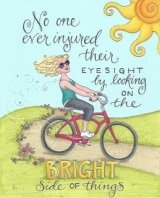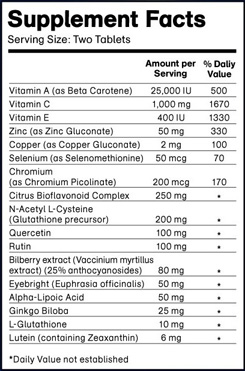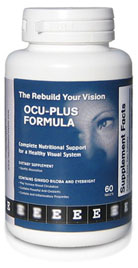|
Dietary Intake Recommendations
|
 |
 |
 |
|
|
 |
 |
 |
These dietary intake recommendations for eye health are guidelines.
Try to get this much of these antioxidants from your foods every day, but don't beat yourself up for not reaching these levels.
Not reaching the dietary intake recommendations for eye health of an antioxidant now and then is not going to doom you to life with an age-related Eye Disease.
Besides, you'll be taking supplements for most of these Eye Health Antioxidants anyway.
Beta-carotene
You need at least 20,000 IU (International Units) of beta-carotene every day for good Healthy Eyes.
The dietary intake recommendations for eye health is 20,000 IU per day from your diet.
Be aware that beta-carotene has been linked with a higher rate of lung cancer in smokers, and high doses may be toxic if taken with alcohol.
Also, your skin may start to turn a yellowish orange color since beta-carotene can accumulate under your skin. (This effect diminishes when you cut back your intake of beta-carotene.)
- A half cup of raw carrots will give you over 16,000 IU, while cooked carrots will give you over 33,000 IU. So it can be as simple as that: eat a half cup of cooked carrots every day to reach the dietary intake recommendations for Eye Care Health. A recommended good eye health dietary allowance of beta-carotene.
Don’t like carrots?
Don’t want to eat carrots every day?
- A half cup of boiled collards will give you over 8,000 IU, as will a half cup of cooked spinach.
- A half cup of mashed sweet potato will give you over 24,000 IU, and a half cup of baked sweet potato will give you over 14,000 IU.
Lutein and Zeaxanthin
You need at least 6 mg (milligrams, or thousandths of a gram) of Lutein for Vision and zeaxanthin every day from your diet. The dietary intake recommendation is 6-10 mg per day.
- A half cup of broccoli will give you almost 1.5 mg.
- Two sticks of dark green celery will take you close to the 6 mg minimum.
- A half cup of cooked mustard greens will also bring you close to the dietary intake recommendations for eye health recommended dietary allowance.
- A half cup of cooked kale will give you over 7 mg.
- A half cup of cooked spinach will give you almost double the minimum requirement.
Vitamin B Complex
Riboflavin (Vitamin B2) deficiency has been connected to Cataract formation, so supplementation is warranted.
However, please note that more than 10 mg per day should not be used if you already have Cataracts, as riboflavin is a photosensitizing chemical.
The interaction of light, oxygen and riboflavin in the eye produces super oxide Free Radicals, which can cause more cataract damage.
If you have cataracts, keep your intake of riboflavin below 10 mg per day to ensure that it does not do more harm than good.
 |
 |
 |
|
|
 |
 |
 |
Vitamin C
You need at least 1,000 mg of Vitamin C daily to help preserve your sight.
You’ll find it very difficult to get this much Vitamin C from your diet, so take a 500 mg supplement and add 500 mg from your diet.
- A half cup of acerolas will give you over 800 mg.
- A half cup of acerola juice will give you almost four times your diet requirement.
- A half cup of fresh orange juice will give you over 60 mg, and a half cup of grapefruit juice will give you almost 50 mg.
If you suffer from glaucoma, you will probably need to take at least 2,000 mg per day, and perhaps as high as 35,000 mg per day.
Your ophthalmologist can help you determine what level of supplementation is best for you.
Vitamin E
You should have between 100 IU and 400 IU of Vitamin E to Protect Your Eyesight from the effects of oxidation.
You can take up to 800 IU before Vitamin E concentrations become toxic (which happens very rarely), but do not take this much if you are using anticoagulants, as Vitamin E also thins the blood.
Most of the best sources of Vitamin E are oils or oily foods, such as seeds, nuts, and wheat germ oil.
Since a lot of fat in your diet can lead to arteriosclerosis ( see Eliminating Harmful Lifestyle Choices ) and decreased circulation to your eyes, you shouldn’t try to get all your Vitamin E from foods.
Instead, take a 400 IU supplement daily (or a 200 IU supplement twice daily), and try for the dietary intake recommendations for eye health of 100 IU from your diet.
- A sixth of a cup of wheat germ oil, sprinkled on cereal or oatmeal, will give you the daily intake you need.
- A half cup of dry roasted almonds will give you about a quarter of your daily need.
- A half cup of peanut butter will give you almost a fifth of what you need.
- A half cup of sunflower seeds will give you just over half of your daily requirement.
The Minerals
Selenium
As mentioned earlier, selenium and Vitamin E work together synergistically, that is, they work better together than either does on its own
You need at least 70 mcg (micrograms, or millionths of a gram) of selenium per day.
The dietary intake recommendations for eye health for selenium is at least 50 mcg from your diet. Whole grains and seafood are the best foods to give you this amount.
- A half cup of cooked brown rice will give you about 40 mcg.
- A half cup of tofu will give you about 11 mcg.
- Four ounces of canned (in water) tuna will give you about 80 mcg.
Zinc
The dietary intake recommendations for eye health is to get at least 50 mg per day of zinc from your diet.
Zinc is a mineral that has been farmed out of North American soils, so many crops have little zinc to offer you.
Meats are higher in zinc, and so are good sources of this important mineral, as long as you don’t eat too much of them due to their high fat content ( see Eliminating Harmful Lifestyle Choices ). Stick to fish and poultry to keep the fat content down.
Zinc levels in your body can be lowered by oral contraceptive and hormone use, and by certain medical conditions.
If you are taking hormone replacement therapy or oral contraceptives, you may need to take even more zinc so that you can get your dietary intake recommendations for eye health.
- A half cup of cashews (dry roasted) will give you less than 4 mg.
- A half cup of whole oats provides just over 3 mg of what you need.
- A half cup of firm tofu will give you 2 mg.
- Four ounces (precooked) of lean sirloin will give you 8 mg.
- Four ounces of chicken (precooked) with the skin on will give you just less than 2.5 mg.
- Four ounces of oysters will give you 43 mg, almost all of your dietary intake recommendations for eye health you need.
- Four ounces of calf’s liver (precooked) will give you 9 mg.
Copper
Your body needs 2 to 4 mg of copper per day.
There is very little copper available in our foods, with the highest amounts in nuts, lentils and dried beans.
Since there is so little copper available in food, there is no dietary intake recommendations for eye health for it.
You should take your 2 to 4 mg daily as a supplement.
Copper supplementation is a must if you are taking zinc, as it tends to interfere with the absorption of copper in your body.
- A half cup of dry roasted cashews will give you about 65% of your daily need.
- A half cup of raw peanuts will give you almost one third of your requirement.
- Four ounces of cooked oysters will give you about one eighth of your daily goal.
Manganese
You need up to 8.5 mg of manganese per day, with up to 5 mg coming from your diet.
The intestines absorb manganese poorly, so you need to ensure you get at least 5 mg per day.
A supplement will provide 3.5 mg.
- A half cup of raw pecans will give you about half of what you need.
- A half cup of dry roasted peanuts will give you 1.5 mg.
- A half cup of cooked brown rice will give you almost 1 mg.

Subscribe to EyeSight Vision Care! , our monthly newsletter with in depth information to help you keep up to date on how to Protect Your Eyesight with a free bonus. Fill out the form below. You'll then receive an email asking you to confirm that you subscribed. You'll always have the option to unsubscribe at the click of your mouse.
dietary intake recommendations for eye health to other important foods
dietary intake recommendations for eye health to protect your eyesight
More Information









